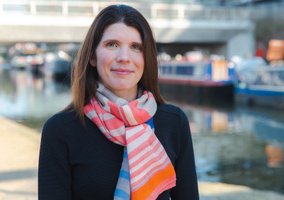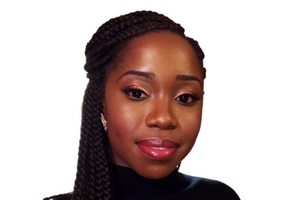Before entering the charity sector, Deafblind UK’s new chief executive Nikki Morris worked as a nurse for several years. She also taught both children and adults.
Morris took up a role as a specialist nurse in a cancer charity and worked her way to deputy chief executive, before becoming CEO of Age UK Camden.
“I got into the third sector by in many ways wanting to make that real tangible difference. It seemed to complement the skill set, the knowledge that I already had.”
She began her CEO role at Deafblind in January this year.
‘We need to raise our income’
Morris is excited to grow the charity after a period of consolidation.
In the year to March 2022, its total income was around £2.7m including legacies, grants from foundations, retail, and care provision and supported living.
“If you want to reach more people in an impactful way, you have to grow income, otherwise, you spread yourself too thin,” she says.
“I’m always about providing quality, sustainable services, so we have to do it in a stepped way. You lay the right foundations for that growth.
“We will grow some of our grant provision, influencing, and research is another area.
“What we really need to do is increase our retail and the corporates this year, and lay that foundation with the fundraising strategy in order to grow that.
“We are looking at those sorts of income streams that at the moment are small, underperforming, or not there at all.
“We’ve been very fortunate with our legacies, but I think there’s more we can do to promote that, because legacies are always unpredictable. And so, I think being proactive around that can be an important thing.”
Lived experience
Morris is keen to research an existing disparity in health with Black and ethnic and minority people with deafblindness.
She has introduced an advisory board, which includes some service users, and is developing subgroups for people who are particularly interested in certain areas.
“I think that’s a really important and a really exciting development, that idea of a body of people who have that lived experience, who are very happy to articulate and share that and both be able to gauge their response on an individual level but also on a cohort level,” Morris says.
“We are already responding much more quickly, and with a much more diverse number of voices to issues as they arise.”
The charity is reliant on its more than 300 volunteers, as well as its around 100 staff.
“We need those volunteers that allow us to deliver those services day in and day out. And then those volunteers that will come on when we’ve got an event or a project that we want to deliver. And you just simply couldn’t do what we do without them.”
Growing need
Deafblind was “hugely impacted” by the coronavirus pandemic both in its back-office functions and the level of need for its services.
The charity’s financial support from grant providers “became an even more important income source” because most of its fundraising and retail had to stop.
There are an estimated 450,000 people living with dual sensory loss, and in 2035 that is predicted to rise to 610,000.
Around three-quarter of the charity’s beneficiaries are older people, with some children and younger adults.
Morris says the growing need for its services therefore remained a pressure during the pandemic.
Collaboration during the pandemic
Morris says that since coronavirus “across the board some of those defences have come down” between charities, and there is more collaboration.
Indeed, “the idea around the benefits of partnership working” was emphasised “and within that, I would say sharing information, sharing data and things like that – it's been much more evident”.
“Not just between third sector partners, but also with statutory providers,” Morris says.
“The statutory sector knows they could not have managed the Covid situation without the third sector. There was never a more important time of having a mature established third sector than during Covid, and I think it was recognised by all. I think that’s been an important change in perspective as to the place of the third sector, and that we are as vital a provision as others.”
Charities “were agile and flexible” during the pandemic, she says.
“We were often able to respond to need first and then the statutory provider could then come in and work in partnership to do that ongoing support.
“As a charity, often you can be the first people to hear what the issues are at the end of your helpline and then respond.”
‘We need to influence the decision makers’
During the pandemic, Morris says the sector has found “we have the same core messages, and that’s very powerful”.
“We as a third sector have matured. I think we’re better at showing impact, for instance, and being able to show value for money, and that we can show that we are the best people to provide some services.
“I think the statutory commissioners are very grateful for that, actually. Because we can often provide services in a more impactful way, because of the position that we sit in within society.”
Morris says that Deafblind does not have a history of campaigning but it is something it wants to develop.
“We really feel that we need to influence the decision-makers at a society level,” she says.
“We provide services at an individual level and at group level, but to ensure that our society is constructed in a way that is responsive to the needs of those living with dual sensory loss, we feel that campaigning is really important.”
Morris says there are some “misconceptions” about deafblindness.
“I think people think you have to be completely deaf or completely blind, in order to access some of the services available either statutory or third sector, and that’s not the case.
“Early intervention in the access to treatments and support that you can have is vital. We would always say: ‘Don’t feel you have to wait to come and chat to us.’”
Plans for the future
Morris aims to grow the charity’s reputation in the UK.
“If people know about us, and know what we do, then people will know to refer to us or to access our services,” she says.
She wants the charity to be able to “influence and also make best use of new technology and new knowledge as it becomes available”.
“We’re definitely looking at more around the end of life and how we can support people around that. So people in care homes, people in hospices, people who've had more complex needs as they grow older. And I think that's important.
“Then also raising awareness from cradle to grave, because that's about developing a society that is understanding and responsive to people who are living with dual sensory loss.”
Morris says: “We’re very aware of people who we support who have no one else, we will often be referred to at a time of crisis.
“So they might have a time of crisis and a health worker or social worker refers, but once their condition is stable, those people withdraw. And I think that’s where the third sector comes into play, because we don’t, we’re still there.
“We must never ever be complacent around the different ways we can reach out for the people that don't seem to have any connections at all. And people often call them hard to reach, but I always call them underserved. Because actually, if you get the right services, if you approach it in the right way and give the right services, they’re very easy to reach.
“It’s just often that we’re approaching in the way that they feel comfortable, or not in a way that we're going to find them.”
Related Articles












